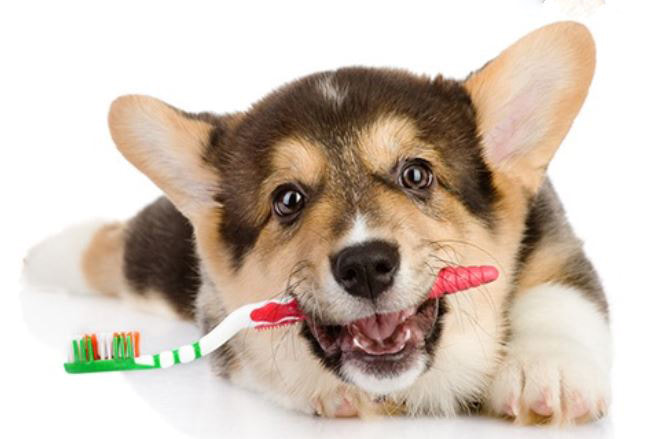|
Most of our pooches have a tendency to be smelly from time-to-time, whether it's their feet, bad breath, or the unmistakable whiff when they come in after a walk in the rain or have rolled in something they find delectable, but makes our eyes water.
Here are some reasons why your dog could be smelly, and what you can do about it. Gas Flatulence is a common problem in dogs and if yours can clear the room after passing gas, it is often caused by intolerance to an ingredient in their food. A natural diet / Raw Food is the best kind of diet, and can help this annoying problem. However excessive wind can sometimes signal an underlying medical issue so if the air around your pet remains whiffy, continue to consult your veterinarian until the problem is resolved. Feed a healthy diet. If you suspect your dog’s diet might be the culprit, try a diet with different ingredients. A good article to read is feeding your pet, which offers lots of ideas and a recipe at the end of the article. Another good read is Thought for food which explains in detail why home made food is streets ahead of the food we buy for our pets in the supermarket. Lastly Home Made Diets article gives you lots of ideas and recipes to help. It would also be good to add a probiotic to the dog’s food, to help your pet to maintain a healthy gut. Atopy / Chronic Skin Conditions Seasonal or food allergies can cause inflammation of the skin which leads to excessive secretion of oil from certain glands in the skin, producing a musty smell. Poor diet can contribute to this condition and can also be the cause of other problems including yeast infections, which also give off a foul odour. These are often caused by a diet high in carbohydrates and processed foods. Changing to a high-protein, non-processed dog food can often help with this. Check out Home Made Diets for recipe ideas. Another chronic skin condition that could cause smelly dogs is Seborrhoea. This can be either the dry form with flakey skin and dandruff, or could be the moist form which is greasy with thickening of the skin and has a musty rancid smell. To help this, bathe your pet using a 100% natural shampoo. It’s important you watch out for the ingredients in a shampoo so you don’t further the problem. We have an article on what to look out for in a natural shampoo for dogs. We also have a 100% natural shampoo bar available on our website. You could also use our natural healing balm around the areas of concern. This will soothe and aid the healing process. Make sure you keep folds in the skin clean and dry. And lastly, feed your dog a healthy diet. If you suspect your dog’s diet might be the culprit, try a diet with different ingredients. – see suggestions above. Dental Problems The number one cause of bad breath in dogs, just like people, is the build-up of plaque and tartar on their teeth. Some small breeds are especially prone to dental problems like gum disease. Another problem specific to certain breeds is Gingival Hyperplasia, the overgrowth of the gums that can harbour small bits of food and produce a rotten smell. Keeping your dog’s teeth clean at home is the first step in solving this problem, but ultimately your pet may need a dental cleaning from a veterinary professional. Start dental hygiene early to prevent problems. This can include annual dental cleanings, brushing your dog’s teeth at home and even certain dog chews can help reduce dental buildup. You can also prevent dental problems by letting them chew raw bones. Raw chicken necks are good and brisket with the piece of rib removed. Our Feeding your Pet article explains this in more detail. Ear Infections There are many types of bacteria and yeast that can cause ear infections. A healthy ear usually has good defences to fight off the bacteria but if the dog suffers from allergies or hormonal imbalances, the yeast and bacteria can increase dramatically, causing a malodorous smell. Dogs with hairy or floppy ears such as Basset Hounds and Springer Spaniels may have consistent ear problems unless the ears are kept clean and dry. Check your dog’s ears periodically and be sure to dry them after swims or baths. Sometimes small seeds can get into the ear and cause infection, so try avoiding long grass when out walking. You can add extra virgin oil to our healing balm to make it into a liquid, and put a few drops in the ear. This will help heal ear infections. Anal Sacs This is one of the most common causes of stinky dogs. All our canine companions have two small scent sacs on their bottom they are a type of marking gland which is why dogs smell rear ends when meeting. If they become impacted and/or infected, they can also abscess. It can cause pain for the dog and an extremely smelly secretion is released and remains on the fur. Another sign your dog has problems with his anal glands is dragging his bottom on the ground, or “scooting.” This is a typical symptom of impaction. Make an appointment with your veterinarian to help with this issue. To help with this, you should bathe your dog regularly. An obvious, yet often neglected solution! Use a shampoo with natural ingredients as above. In conclusion, if the stink persists, consult your veterinarian as some medical conditions can produce strange odours. Breath that smells fruity or sweet, like sweet almonds, could indicate diabetes while kidney disease or bladder infection can result in breath that smells like urine or rotten seaweed.
4 Comments
|
AuthorChris Piper Archives
November 2021
Categories |


 RSS Feed
RSS Feed